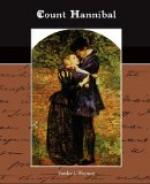The rabble were still a hundred paces away, piled up and pressed about a house where men were being hunted as men hunt rats. He saw that he was unnoted, and apprehension gave place to rage. His thoughts turned back hissing hot to the thing that had happened, and in a paroxysm of shame he shook his fist at the gaping casement and the sneering face of his rival, dimly seen in the background. If a look would have killed Tavannes—and her—it had not been wanting.
For it was not only the man M. de Tignonville hated at this moment; he hated Mademoiselle also, the unwitting agent of the other’s triumph. She had thrust him from her; she had refused to be guided by him; she had resisted, thwarted, shamed him. Then let her take the consequences. She willed to perish: let her perish!
He did not acknowledge even to himself the real cause of offence, the proof to which she had put his courage, and the failure of that courage to stand the test. Yet it was this, though he had himself provoked the trial, which burned up his chivalry, as the smuggler’s fire burns up the dwarf heath upon the Landes. It was the discovery that in an heroic hour he was no hero that gave force to his passionate gesture, and next moment sent him storming down the beetling passage to the Rue du Roule, his heart a maelstrom of fierce vows and fiercer menaces.
He had reached the further end of the alley and was on the point of entering the street before he remembered that he had nowhere to go. His lodgings were no longer his, since his landlord knew him to be a Huguenot, and would doubtless betray him. To approach those of his faith whom he had frequented was to expose them to danger; and, beyond the religion, he had few acquaintances and those of the newest. Yet the streets were impossible. He walked them on the utmost edge of peril; he lurked in them under the blade of an impending axe. And, whether he walked or lurked, he went at the mercy of the first comers bold enough to take his life.
The sweat stood on his brow as he paused under the low arch of the alley-end, tasting the bitter forlornness of the dog banned and set for death in that sunlit city. In every window of the gable end which faced his hiding-place he fancied an eye watching his movements; in every distant step he heard the footfall of doom coming that way to his discovery. And while he trembled, he had to reflect, to think, to form some plan.
In the town was no place for him, and short of the open country no safety. And how could he gain the open country? If he succeeded in reaching one of the gates—St. Antoine, or St. Denis, in itself a task of difficulty—it would only be to find the gate closed, and the guard on the alert. At last it flashed on him that he might cross the river; and at the notion hope awoke. It was possible that the massacre had not extended to the southern suburb; possible, that if it had, the Huguenots who lay there—Frontenay, and Montgomery, and Chartres, with the men of the North—might be strong enough to check it, and even to turn the tables on the Parisians.




